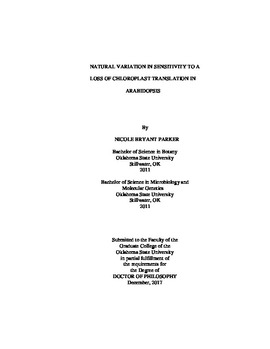| dc.contributor.advisor | Meinke, David W. | |
| dc.contributor.author | Parker, Nicole Bryant | |
| dc.date.accessioned | 2018-06-18T16:02:23Z | |
| dc.date.available | 2018-06-18T16:02:23Z | |
| dc.date.issued | 2017-12 | |
| dc.identifier.uri | https://hdl.handle.net/11244/300067 | |
| dc.description.abstract | This dissertation describes my role in an NSF-funded research project in the Meinke laboratory that began as a natural variation study and genetic analysis to uncover the nuclear genes involved in the differing responses of plant species to a loss of chloroplast translation. To identify these nuclear genes, we analyzed 152 natural accessions of Arabidopsis (Arabidopsis thaliana) on spectinomycin, an inhibitor of chloroplast translation, and crossed wild-type plants of the tolerant Tsu-0 accession with plants segregating for an embryo-defective (emb) mutation that eliminated chloroplast translation in the sensitive "Nossen" accession. Through this study, we found a single suppressor locus (ACC2), an enhancer of the suppressor, and additional modifiers that further increase embryo development. After determining that ACC2 suppresses the loss of chloroplast translation in emb mutants, we expanded our project to include a detailed analysis of defects in ACC2 and the consequences of various mutations on a class of proteins essential for growth and development in plants. Remarkably, some of the most sensitive accessions contain null alleles of ACC2, including "Nossen". For the final part of my role in this project, I focused on using a candidate gene approach to identify additional genetic modifiers of this system. Overall, the project described throughout this dissertation utilized natural variation in Arabidopsis accessions to study the effects of mutations, especially deleterious mutations, on a protein (ACCase) that is essential for fatty acid biosynthesis in eukaryotes. We also developed an understanding of some of the mechanisms behind the diverse phenotypic responses plant species have when translation of the chloroplast genome is blocked. Furthermore, our identification of accessions hypersensitive to spectinomycin has led to a more efficient method for plastid transformation in Arabidopsis (Yu et al., 2017). | |
| dc.format | application/pdf | |
| dc.language | en_US | |
| dc.rights | Copyright is held by the author who has granted the Oklahoma State University Library the non-exclusive right to share this material in its institutional repository. Contact Digital Library Services at lib-dls@okstate.edu or 405-744-9161 for the permission policy on the use, reproduction or distribution of this material. | |
| dc.title | Natural variation in sensitivity to a loss of chloroplast translation in arabidopsis | |
| dc.contributor.committeeMember | Doust, Andrew N. | |
| dc.contributor.committeeMember | Fishbein, Mark | |
| dc.contributor.committeeMember | Schoenknecht, Gerald | |
| dc.contributor.committeeMember | Burnap, Robert Lord | |
| osu.filename | Parker_okstate_0664D_15464.pdf | |
| osu.accesstype | Open Access | |
| dc.type.genre | Dissertation | |
| dc.type.material | Text | |
| thesis.degree.discipline | Plant Science | |
| thesis.degree.grantor | Oklahoma State University | |
